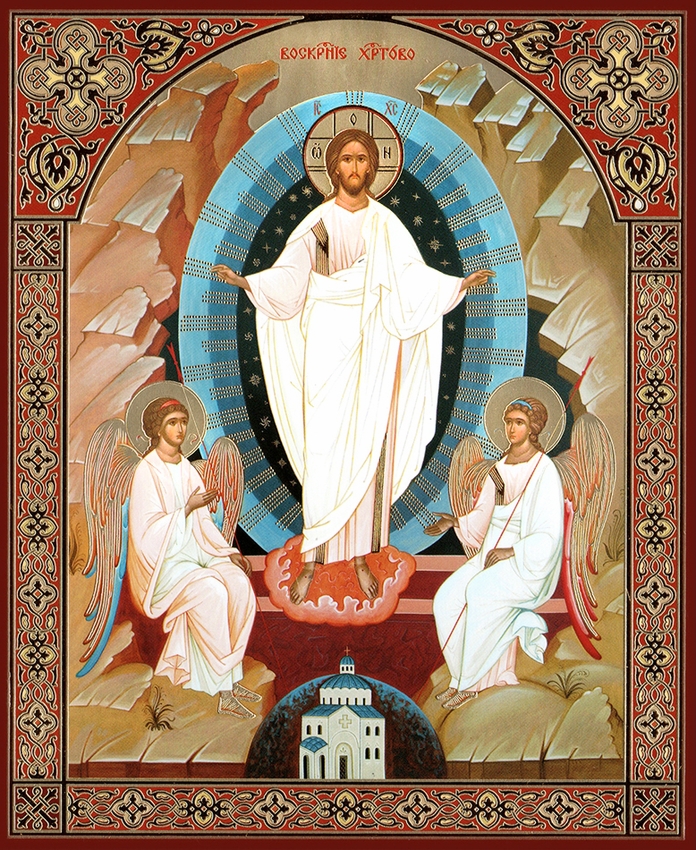The Resurrection of Our Lord
Commemorated on May 2

Pascha (Easter)
Enjoy ye all the feast of faith; receive ye all the riches of loving-kindness.
(Sermon of Saint John Chrysostom, read at Paschal Matins)
The resurrection of Jesus Christ from the dead is the center of the Christian faith. Saint Paul says that if Christ is not raised from the dead, then our preaching and faith are in vain (I Cor. 15:14). Indeed, without the resurrection there would be no Christian preaching or faith. The disciples of Christ would have remained the broken and hopeless band which the Gospel of John describes as being in hiding behind locked doors for fear of the Jews. They went nowhere and preached nothing until they met the risen Christ, the doors being shut (John 20: 19). Then they touched the wounds of the nails and the spear; they ate and drank with Him. The resurrection became the basis of everything they said and did (Acts 2-4): “. . . for a spirit has not flesh and bones as you see that I have” (Luke 24:39).
The resurrection reveals Jesus of Nazareth as not only the expected Messiah of Israel, but as the King and Lord of a new Jerusalem: a new heaven and a new earth.
Then I saw a new heaven and a new earth. . . the holy city, new Jerusalem. And I heard a great voice from the throne saying “Behold, the dwelling place of God is with men. He will dwell with them, and they shall be his people. . . He will wipe away every tear from their eyes, and death shall be no more, neither shall there be mourning nor crying nor pain any more, for the former things have passed away (Rev. 21:1-4).
In His death and resurrection, Christ defeats the last enemy, death, and thereby fulfills the mandate of His Father to subject all things under His feet (I Cor. 15:24-26).
Worthy is the Lamb who was slain, to receive power and wealth and wisdom and might and honor and glory and blessing (Rev. 5: 12)
The Feasts of Feasts
The Christian faith is celebrated in the liturgy of the Church. True celebration is always a living participation. It is not a mere attendance at services. It is communion in the power of the event being celebrated. It is God’s free gift of joy given to spiritual men as a reward for their self-denial. It is the fulfillment of spiritual and physical effort and preparation. The resurrection of Christ, being the center of the Christian faith, is the basis of the Church’s liturgical life and the true model for all celebration. This is the chosen and holy day, first of sabbaths, king and lord of days, the feast of feasts, holy day of holy days. On this day we bless Christ forevermore (Irmos 8, Paschal Canon).
Preparation
Twelve weeks of preparation precede the “feast of feasts.” A long journey which includes five prelenten Sundays, six weeks of Great Lent and finally Holy Week is made. The journey moves from the self-willed exile of the prodigal son to the grace-filled entrance into the new Jerusalem, coming down as a bride beautifully adorned for her husband (Rev. 21:2) Repentance, forgiveness, reconciliation, prayer, fasting, almsgiving, and study are the means by which this long journey is made.
Focusing on the veneration of the Cross at its midpoint, the lenten voyage itself reveals that the joy of the resurrection is achieved only through the Cross. “Through the cross joy has come into all the world,” we sing in one paschal hymn. And in the paschal troparion, we repeat again and again that Christ has trampled down death—by death! Saint Paul writes that the name of Jesus is exalted above every name because He first emptied Himself, taking on the lowly form of a servant and being obedient even to death on the Cross (Phil. 2:5-11). The road to the celebration of the resurrection is the self-emptying crucifixion of Lent. Pascha is the passover from death to life.
Yesterday I was buried with Thee, O Christ.
Today I arise with Thee in Thy resurrection.
Yesterday I was crucified with Thee:
Glorify me with Thee, O Savior, in Thy kingdom (Ode 3, Paschal Canon).